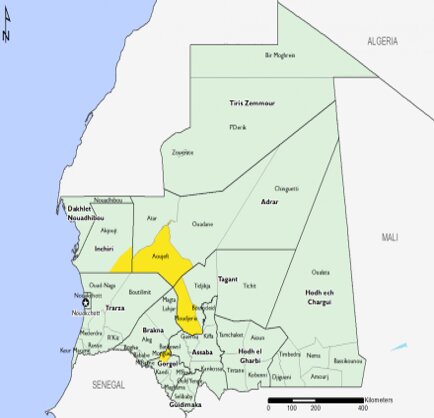Mauritania

Overall, Mauritania has 2 endemicity zones which are the Sahelian zone (a rice growing and seasonal agricultural area) in the south and south-east of the country which covers 8 Wilayas and the Saharan zone, represented by the four northern wilayas and the capital Nouakchott. In the Saharan zone, cases of malaria are rare or absent.
Effective vector control and the use of preventive antimalarial drugs are two key components in the elimination of malaria in Mauritania. The main aim for implementing SMC is to protect children aged 3-59 months against malaria and in particular, protect children living in the Mberra refugee camp as well as nomadic populations who are not usually reached by mainstream approaches. A mobile distribution system has also been set up to reach remote or hard-to-reach populations.
The National Malaria Control Program (NMCP) implemented SMC starting in 2022 and continued in 2023 for 7 of the 12 eligible Moughataas. Due to lack of funding, only 7 of the 12 eligible Moughataas implemented SMC with Global Fund.
In 2023, Mauritania implemented three cycles of SMC from October to December in children aged 3-59 months. 87% of the target population received all doses. No major adverse event was recorded. One main issue is insufficient funding.
In 2023, SMC was not coupled with other interventions. Nevertheless, the distribution of insecticide treated nets took place at the same time as SMC. As implementing actors are the same, duplication of activities was avoided.
|
|
2023 |
2024 |
|
Dates for the beginning and end of the cycle |
October -December |
August – November |
|
Number of cycles |
3 |
4 |
|
Number of districts targetted |
7/12 |
7/12 |
|
Number of children targetted |
119010 |
121961 |
|
Age range covered |
3 to 59 months |
3 to 59 months |
|
Coverage (% of targeted children reached) |
87% |
95% |
|
Were tests for the resistance to the medicines carried out? (yes/no) |
No |
NA |
|
Gap |
5 Districts |
5 Districts |